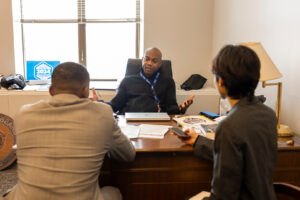Restore the Vote, a law that passed in 2023 allowing Minnesotans who are not currently incarcerated for a felony conviction to vote, matters to young people – and any people – who have been incarcerated or know others who have been. About 55,000 people can now vote as a result of the law.

Dylan Leung and Marquan Harper interviewed Minnesota Rep. Cedrick Frazier (DFL, New Hope) and voting rights advocate Wintana Melekin about the law and why it matters.
Aside from it mattering to your constituents, why does Restore the Vote matter to you?
I grew up in Chicago by way of Mississippi, where my family’s from. My grandfather was born and raised in that area and had to flee when he was a young man because he was going to get lynched. He was born before the Voting Rights Act was passed; before the Civil Rights Act was passed. Hearing those stories growing up, it meant a lot to me knowing that I could be just one of the many folks who have fought for access to democracy.
What does it mean for Minnesota?
More than 50,000 people can now use their voice in our democracy. They couldn’t before Restore the Vote passed. They were going back to their communities and to their families – working jobs, paying taxes and doing all the things that you want folks to do in a good society in a positive way. But they couldn’t pick the folks who represent them from a political and policy perspective. That wasn’t fair.

What does it mean for young people?
It means they get to see those individuals in their lives, who have had their voices taken away, get their voices restored.
What challenges has Restore the Vote faced?
There’s an ongoing lawsuit. Some people wanted to stop the bill, saying it was unconstitutional and that the Legislature didn’t have the authority to pass it. I clearly think that is not true.
What does it mean to have 55,000 new voters?
It means a lot. Some of our electoral races are decided by less than 100 votes. It’s so important that our Legislature has a representative democracy where our legislators reflect the people we’re serving. Allowing these 55,000 people to have their voices heard means we’re going to have a better opportunity to have legislation that reflects all the people that we’re serving.
Can Restore the Vote be repealed?
It can be repealed if another legislative body says they want to repeal it. That’s every law. We make these laws, but future lawmakers can change them. That’s democracy. You’re doing what the will of the people want in the moment.
Do you know anyone personally who is impacted by this?
There are people in my family who have been incarcerated and lost their right to vote. Illinois has now done Restore the Vote, so that’s no longer the case.
How is this related to voter suppression?
Historically, people were disenfranchised based on their race. We’ve got documentation of legislators around the country who emphatically said they are putting these felony disenfranchisement laws in place because they were concerned that certain people – newly released people who were enslaved – will start to express themselves politically and start making laws.
There’s an assumption that Restore the Vote only affects people of color, and that they’re more likely to vote for Democrats. Is that true?
It would be ignorant to believe that people of color are a monolith. There are people of color who support Donald Trump for president and voted for him both times. We are not a monolith.
This is not a partisan issue. There are blue states and red states that have passed Restore the Vote. Whatever your political affiliation is, this is a country built on representative democracy, and we want people to be able to participate in that.
Marquan worked with reporter Trisha Ahmed of The Associated Press to finish his story. This story was completed at ThreeSixty’s Winter News Team: Capitol Edition in February 2024, where high school journalists covered important legislative issues, impacting Minnesota youth. Read more stories here.
